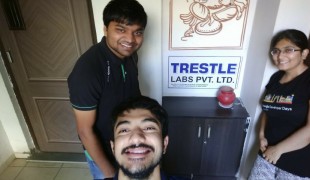- 6859
- 514
- 8
- 10
- 0
- Help Ukraine
About the solution
Chieko had a swimming pool accident that left her blind when she was 14.
"When I started out there was no assistive technology. I couldn't read any information by myself. I couldn't go anywhere by myself”, she recalled.
She has been dedicating her life to create technology that can help her and other people who are visually impaired have a better and more independent life.
Chieko took a computer science course for blind people and then started working at IBM. She worked on early digital Braille innovations and created the world's first practical web-to-speech browser.
Now, the scientist and other experts are working with AI tools to help improve the lives of visually impaired patients.
Chieko is working with micro mapping. She built NavCog, a voice-controlled smartphone app that helps blind people navigate complicated indoor locations. It works thanks to low-energy Bluetooth beacons are installed roughly every 10m (33ft) to create an indoor map. Sampling data is collected from those beacons to build "fingerprints" of a specific location.
The expert is also developing a lightweight AI suitcase navigational robot. This gadget steers a blind person through the complex terrain of an airport, providing directions as well as useful information on flight delays and gate changes, for example. The suitcase features a motor, to move on its own, and also has an image-recognition camera to detect surroundings, and Lidar - Light Detection And Ranging - for measuring distances to objects.
These products are still prototypes.
Adapted from: https://bit.ly/2PZir9y
https://www.youtube.com/watch?v=f-mQIWnO3Ag
This solution shall not include mention to the use of drugs, chemicals or biologicals (including food); invasive devices; offensive, commercial or inherently dangerous content. This solution was not medically validated. Proceed with caution! If you have any doubts, please consult with a health professional.
DISCLAIMER: This story was written by someone who is not the author of the solution, therefore please be advised that, although it was written with the utmost respect for the innovation and the innovator, there can be some incorrect statements. If you find any errors please contact the patient Innovation team via info@patient-innovation.com
-
-
605
-
0
-
9493

Eye controlled communication devices
COMMUNICATION: Communicating, whether by speaking, listening, or other means
CAREGIVING
Cerebral Palsy
Assistive Daily Life Device (to help ADL)
Assistive Technology access
Recovering cognitive function
Promoting self-management
Managing Neurological Disorders
Promoting inclusivity and social integration
Improving Speech and Communication
Neurology
Ophthalmology
Pediatrics
United States
-
-
-
535
-
0
-
7449

Graduates team creates an app to help visually impaired in their education
Studying
Reading
COMMUNICATION: Communicating, whether by speaking, listening, or other means
Blindness
Assistive Daily Life Device (to help ADL)
App (Including when connected with wearable)
Online service
Vision problems
Promoting self-management
Promoting inclusivity and social integration
Improving Speech and Communication
To improve Treatment/Therapy
Raise awareness
Ophthalmology
India
-
-
-
368
-
0
-
4700

Memory Lane Games - Reigniting memories for those with Dementia & Alzheimer's
CAREGIVING
COMMUNICATION: Communicating, whether by speaking, listening, or other means
Alzheimer's Disease
App (Including when connected with wearable)
Videogame
Memory loss
Recovering cognitive function
Promoting self-management
Managing Neurological Disorders
Building Supportive Community Relationships
Promoting inclusivity and social integration
Enhancing Mental Health
Improving Speech and Communication
To improve Treatment/Therapy
Preventing (Vaccination, Protection, Falls, Research/Mapping)
Raise awareness
Caregiving Support
General and Family Medicine
Neurology
United Kingdom
-
 en
en